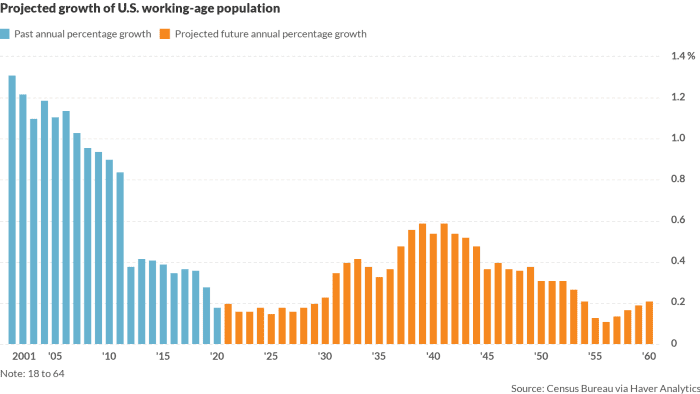#Peter Morici: America’s baby drought poses a risk to our prosperity and security

Table of Contents
“#Peter Morici: America’s baby drought poses a risk to our prosperity and security”
Without enough babies a civilization cannot survive. That’s an issue feminism has yet to address.
The COVID pandemic has hit women in the workplace hard. They serve in many public-facing positions that were at least temporarily lost, and school closures exacerbated already difficult child-care challenges.
Equally disquieting, the crisis accelerated the secular decline in the U.S. birthrate. The lifetime fertility rate hit a record low of 1.64. A ratio of 2.1 is required to sustain the native population.
Dependency ratio
Since 2005, the ratio of working-age Americans to seniors has fallen from 5.1 to 3.6. If women continue to have fewer babies, that ratio is projected to fall to 2.4 by 2060. This phenomenon is mirrored among other economically advanced democracies and China.
Congress quietly taxes senior benefits to compensate.
Half of workers’ payroll taxes are paid with after income tax funds but for many seniors who have prudently saved through IRAs and other vehicles, 85% of Social Security retirement benefits are taxed. Medicare premiums rise precipitously with postretirement income, and the dynamics of the system force seniors who can afford to purchase supplemental health insurance to do so.
Those policies were not imposed as aggressively on earlier generations. As the dependency ratio becomes more onerous and seniors expect a larger slice of the pie, pressures will build for policy makers to cook up new ways to implicitly limit promised net benefits.
Most seniors are counseled to keep a significant portion of their assets in fixed-income vehicles. The Federal Reserve’s policy to boost inflation and keep interest rates low erodes the value of those assets. The returns
TMUBMUSD10Y,
are often below the rate of inflation and to add insult to injury, the interest income is taxed without adjustment for inflation.
Taxing Grandma
Easy money is great for the banks. They can borrow from the Fed at near zero cost to help finance business loans, but the Fed is effectively taxing grandma to subsidize Goldman-Sachs.
The average age of American workers is rising, but an older workforce may be less productive. They are slower to embrace new technologies and less inclined to start high-risk enterprises that generate innovations and boost productivity and incomes for everyone.

The working-age population is growing very slowly compared with earlier years.
Over the decade before COVID, the annual growth in the U.S. labor force was a scant 0.7% and with that, sustaining economic growth appreciably better than 2% was terribly difficult. That exacerbates the challenge of competing with China and Russia in military resources, R&D and the instruments of soft-power diplomacy.
Immigration can help but assimilation costs—such as higher social service and educational costs and the cultural friction that accompanies competition for resources—become more difficult to bear as more immigrants relative to native native-born Americans are in our schools and vying for jobs, especially on the lower rungs of the income ladder.
Family-friendly policy
Progressives advocate federally financed child-care, child allowances and guaranteed paternity leaves to ease burdens on working women, but those have had quite limited impacts on fertility rates in other countries.
Notable exceptions include Quebec, France and Georgia—the former Soviet Republic. Catholicism and the Orthodox Church more heavily influence culture in those places—social norms and values can be more important than pro-natal policies
Importantly, the cost of preparing children for a prosperous middle-class life has risen precipitously. University tuition has significantly outstripped inflation and family incomes for the last generation, and competition for admissions at prestigious institutions whose diplomas more likely guarantee a prosperous and influential future grows ever more intense.
The latter has created an arms race among middle-class parents to invest in adolescents with private schools, tutors, neat summer experiences and the like.
More important, as women advance in the professions, the trade-offs between careers and child rearing become tougher for reasons having nothing to do with economics.
Economist and demographer Lyman Stone observed, “As jobs, even ‘family-friendly’ jobs, turn into careers, and careers turn into essentially religious or spiritual vocations, family is deprioritized and birthrates decline.”
Enabling women’s advancement in the workplace through family-friendly policies increases measured national income and product—GDP—but may actually discourage larger families, tax long-term growth, and exacerbate crises related to caring for the elderly and competing with China.
It’s a tough balance but without enough babies a civilization cannot survive. That’s an issue feminism has yet to address.
Peter Morici is an economist and emeritus business professor at the University of Maryland, and a national columnist.
More insights from Peter Morici
As inflation continues to heat up, Jerome Powell is going to have some ‘splaining to do
Americans don’t want socialism shoved down their throats
Half measures won’t do in the competition with China
By
Peter Morici
If you liked the article, do not forget to share it with your friends. Follow us on Google News too, click on the star and choose us from your favorites.
For forums sites go to Forum.BuradaBiliyorum.Com
If you want to read more News articles, you can visit our News category.




